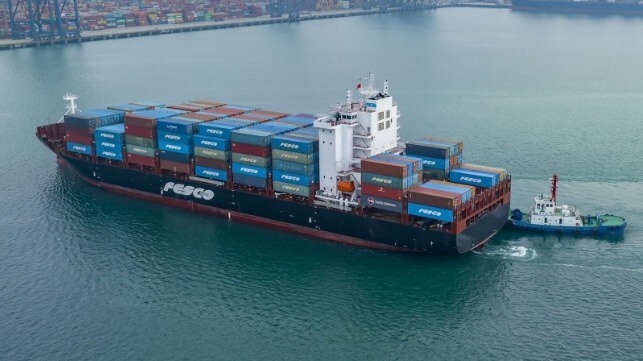Restricted in the West, Russia Expands Trade Links in Southeast Asia

The Russian container line FESCO is further expanding its Intra-Asia service to include a new port call in Pasir Gudang, Malaysia. This becomes the second port of call for FESCO in Malaysia.
FESCO entered the Malaysian shipping scene almost six months ago, with a service at Port Klang connecting to the Vietnamese port of Ho Chi Minh City. The route is served once a week, with a transit time of three days between the ports.
The addition of Pasir Gudang will expand the geography of the FESCO Intra Asia Service (FIAS) between Malaysia and Vietnam, according to the company. The service is served by a 400 TEU containership from the FESCO fleet. The first departure from Pasir Gudang took place on February 8.
“Pasir Gudang is one of the largest ports in Malaysia, which is literally next door to Singapore. Our team did a great job for FESCO to receive permission for cabotage transportation from the Malaysian authorities. On the very first voyage, we sent cargo not only from Pasir Gudang to Russia via our hub in Ho Chi Minh City, but also carried out domestic transportation between Malaysian ports,” said German Maslov, Vice President of FESCO’s Liner Logistics Division.
Maslov added that FESCO is planning to expand FIAS to Thailand and also studying the possibility of adding a second vessel to the service. FESCO wants to develop FIAS as an Asian feeder line to deliver additional cargo volumes to Russia from markets such as Malaysia, Sri Lanka, Singapore, Indonesia, Bangladesh, India and Thailand.
The ramp-up of FESCO’s service in Southeast Asian countries follows the launch of a subsidiary enterprise, DBF Logistics Vietnam, back in December. Besides FIAS, the new company will ensure smooth operation of the FESCO Vietnam Direct Line, which connects Russia’s Far East Port of Vladivostok and Vietnam’s Haiphong and Ho Chi Minh City.

that matters most
Get the latest maritime news delivered to your inbox daily.
“The container transportation market is actively developing between Russia and Vietnamese ports. We transported 25,700 TEU last year. Therefore, we essentially grew several times over in three years,” said FESCO’s Group President, Pyotr Ivanov.
Meanwhile, as the West tightens economic sanctions against Russia, there is a noticeable drop in the amount of liquid cargo handled at Russian ports. Last week, the Russian Commercial Seaports Association reported that cargo handling in major ports fell by 1.6 percent year-on-year to 71.6 million tons in January. Liquid cargo transshipment fell 6.1 percent to 37.3 million tons, including 8.5 percent to 21.2 million tons of crude oil and 5.1 percent to 11.6 million tons of oil products. However, handling of liquefied natural gas (LNG) rose 4.4 percent to 3.4 million tons.
